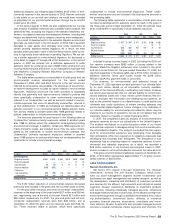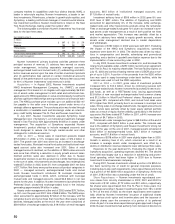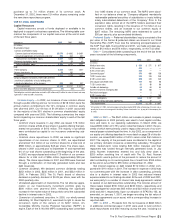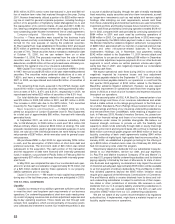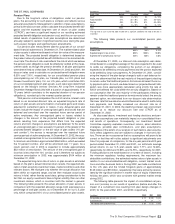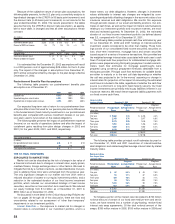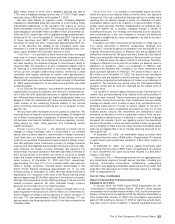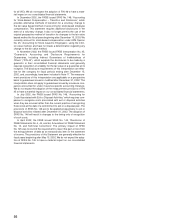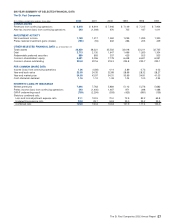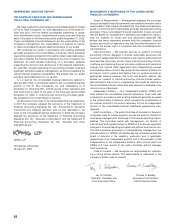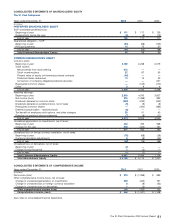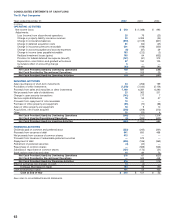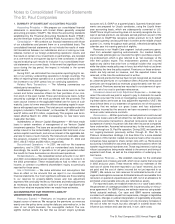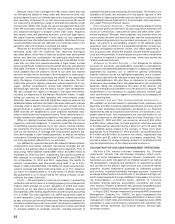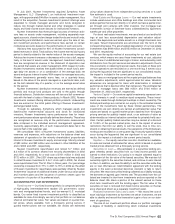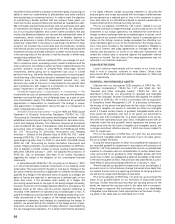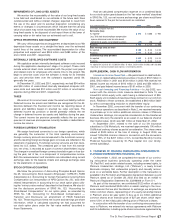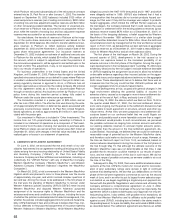Travelers 2002 Annual Report Download - page 60
Download and view the complete annual report
Please find page 60 of the 2002 Travelers annual report below. You can navigate through the pages in the report by either clicking on the pages listed below, or by using the keyword search tool below to find specific information within the annual report.
INDEPENDENT AUDITORS’ REPORT
THE BOARD OF DIRECTORS AND SHAREHOLDERS
THE ST. PAUL COMPANIES, INC.:
We have audited the accompanying consolidated balance sheets
of The St. Paul Companies, Inc. and subsidiaries as of December 31,
2002 and 2001, and the related consolidated statements of opera-
tions, shareholders’ equity, comprehensive income and cash flows for
each of the years in the three-year period ended December 31, 2002.
These consolidated financial statements are the responsibility of the
Company’s management. Our responsibility is to express an opinion
on these consolidated financial statements based on our audits.
We conducted our audits in accordance with auditing standards
generally accepted in the United States of America. Those standards
require that we plan and perform the audit to obtain reasonable assur-
ance about whether the financial statements are free of material mis-
statement. An audit includes examining, on a test basis, evidence
supporting the amounts and disclosures in the financial statements.
An audit also includes assessing the accounting principles used and
significant estimates made by management, as well as evaluating the
overall financial statement presentation. We believe that our audits
provide a reasonable basis for our opinion.
In our opinion, the consolidated financial statements referred to
above present fairly, in all material respects, the consolidated financial
position of The St. Paul Companies, Inc. and subsidiaries as of
December 31, 2002 and 2001, and the results of their operations and
their cash flows for each of the years in the three-year period ended
December 31, 2002, in conformity with accounting principles gener-
ally accepted in the United States of America.
As discussed in the notes to the consolidated financial statements,
in 2001 the Company adopted the provisions of the Statement of
Financial Accounting Standards No. 133, “Accounting for Derivative
Instruments and Hedging Activities” and, as also described in the
notes to the consolidated financial statements, in 2002 the Company
adopted the provisions of the Statement of Financial Accounting
Standards No. 141, “Business Combinations” and the Statement of
Financial Accounting Standards No. 142, “Goodwill and Other
Intangible Assets.”
KPMG LLP
Minneapolis, Minnesota
January 27, 2003
MANAGEMENT’S RESPONSIBILITY FOR CONSOLIDATED
FINANCIAL STATEMENTS
Scope of Responsibility — Management prepares the accompa-
nying consolidated financial statements and related information and is
responsible for their integrity and objectivity.The statements were pre-
pared in conformity with United States generally accepted accounting
principles. These consolidated financial statements include amounts
that are based on management’s estimates and judgments, particu-
larly our reserves for losses and loss adjustment expenses. We
believe that these statements present fairly the company’s financial
position and results of operations and that the other information con-
tained in the annual report is consistent with the consolidated finan-
cial statements.
Internal Controls — We maintain and rely on systems of internal
accounting controls designed to provide reasonable assurance that
assets are safeguarded and transactions are properly authorized and
recorded. We continually monitor these internal accounting controls,
modifying and improving them as business conditions and operations
change. Our internal audit department also independently reviews
and evaluates these controls.We recognize the inherent limitations in
all internal control systems and believe that our systems provide an
appropriate balance between the costs and benefits desired. We
believe our systems of internal accounting controls provide reason-
able assurance that errors or irregularities that would be material to
the consolidated financial statements are prevented or detected in the
normal course of business.
Independent Auditors — Our independent auditors, KPMG LLP,
have audited the consolidated financial statements. Their audit was
conducted in accordance with auditing standards generally accepted
in the United States of America, which includes the consideration of
our internal controls to the extent necessary to form an independent
opinion on the consolidated financial statements prepared by man-
agement.
Audit Committee — The audit committee of the board of directors,
composed solely of outside directors, assists the board of directors in
overseeing management’s discharge of its financial reporting respon-
sibilities. The committee meets with management, our director of
internal audit and representatives of KPMG LLP to discuss significant
changes to financial reporting principles and policies and internal con-
trols and procedures proposed or contemplated by management, our
internal auditors or KPMG LLP. Additionally, the committee assists the
board of directors in the selection, evaluation and, if applicable,
replacement of our independent auditors; and in the evaluation of the
independence of the independent auditors. Both internal audit and
KPMG LLP have access to the audit committee without manage-
ment’s presence.
Code of Conduct — We recognize our responsibility for maintain-
ing a strong ethical climate. This responsibility is addressed in the
company’s written code of conduct.
Jay S. Fishman Thomas A. Bradley
Chairman, President and Executive Vice President
Chief Executive Officer Chief Financial Officer
58



